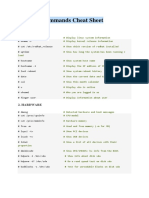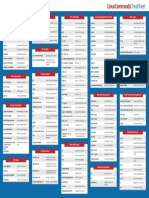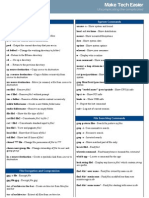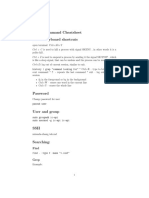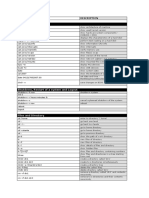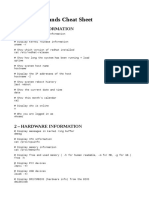main_linux-commands-cheat-sheet (1)
Uploaded by
demy2014main_linux-commands-cheat-sheet (1)
Uploaded by
demy2014Linux Commands Cheat Sheet
Hardware Information
Searching File Commands System Management and Info
Disk Usage
dmesg grep [pattern] [file] Search for a pattern in
Show bootup a file ls List files in the directory uname -r Show system information
cat /proc/cpuinfo grep -r [pattern] [directory] Search a pattern
messages Show CPU recursively ls -a List files, include hidden uname -a Show kernel release info df -h Show free space on
free -h locate [name] system
information Search for files & pwd files Show current uptime Show uptime length/avg. df -l Show free nodes on
lshw find [/location] -name [x] system
Show free and used List items beginning mkdir [name] directory Create a hostname load Show system fdisk -l Disk partition types and
with [x]
lsblk find [/location] -size [+100M] sizes
memory Hardware List items larger than rm [file] directory hostname -l hostname Show system du -ah Show disk usage for all
lspci -tv 100MB files
configuration info Block rm -r [directory] Remove a file last reboot IP address Show reboot Show disk usage for
du -sh
lsusb -tv current directory
devices info File Transfer rm -rf [directory] Recursively remove date history
findmnt Show target mount
Tree-diagram of PCI directory Force remove Show current time and date point
mount [device] [mount_point] Mount a device
devices Tree-diagram of directory
USB devices
dmidecode Show BIOS hardware cp [file1] [file2] Copy file1 to file2 timedatectl Manage the system clock
info scp [file.txt] [server/tmp] Create a tar file from a
file
hdparm -i /dev/[disk] cp -r [directory1] [directory2] Copy directory1 to cal Show current day and
Show disk data info rsync -a [/location]
Sync the contents of
hdparm -tT /dev/[disk] mv [filename1] [filename2] directory2 Rename afile whoami month Show the current
[/backup/] a location with the
Disk read speed
badblocks -s /dev/[disk]
backup directory
ln -s [/path/file] [link] finger [username]
Variables
Create symbolic link to user
test Unreadable file
touch [file] ulimit [flags] [limit] Show user information let "[variable]=[value]" Assign integer value to var
blocks test Create a new file
View or limit system resources export [variable] Export a Bash variable
File Compression Process Related declare [variable]="[value]" Declare a Bash variable
more [file] Show file contents shutdown [hh:mm] Schedule a system shut down
tar cf [file.tar] [file] Create a tar file from a set List variables and functions
ps Show active process head [file] Show first 10 lines of a shutdown now Shut down immediately
snapshot
tar xf [file.tar] Extract archived echo $[variable] Display value of the
pstree file Show processes as a tail [file] file Show last 10 lines modprobe [module-name] Add a new kernel module variable
killall [process_name] tree
tar czf [file.tar.gz] Create a gzip tar
file Show process memory gpg -c [file] of a file Encrypt a file Show all network
pmap
usage interfaces
gzip [file] Create a gz compressed
file Show all running gpg [file.gpg]
top Decrypt a file Network Management
processes Shell Command Management
kill [process_id] Kill the process by wc Count words/lines/bytes
ID
ip addr Show IP alias [alias]='[command]' Create command
pkill [process_name] Kill the process by ls | xargs wc show
Words/lines/bytes in addresses alias
Package Installation name watch -n [interval] [command]Set interval to run a command
ip address add [ip] Assign IP address to
Kill all processes by cut -d[delimiter] [file] interface
name directory Cut file section sleep [interval] && [command] Postpone command execution
yum search [keyword] Find a package by a trap "[commands]" [signal] ifconfig
keyword List background [data] | cut -d[delimiter]
bg and print
processes
netstat -pnltu
Most recent suspended awk '[pattern] {print $0}' [file] dig -x [ip] IP address reverse
yum info [package] Package info & Cut data section and print
apt install [package] Install a package with job to foreground lookup
fg summary netstat -nutlp Print command
APT
shred -u [file] history
Bring [job] to Print lines matching a
yum Install whois [domain] Show domain's DNS
foreground info
install [package.rpm] a package with diff [file1] pattern Overwrite and
List files opened by Domain reverse Keyboard Shortcuts
fg [job] dig [domain]
[file2] source lookup
delete a file Compare two
Execute command on
dnf Install dig -x [host]
signal [file]
install [package.rpm] a package with files
lsof
[command] | tee [file]
Pause terminal until Compile from source
rpm -i [package.rpm] >/dev/null
process completes code
Install a local rpm
package Store command output to
a Ctrl + Z Stop process (can be
rpm Remove
Users and Groups
file, skip terminal output hostname -l Show local IP resumed)
-e [package.rpm] an rpm
address Ctrl + W Cut the word before the
wait
cursor
Ctrl + C Kill current
process
tar zxvf [source_code.tar.gz]
chown [user]:[group] [file] Change file owner and userdel [user] Delete a cd [/location] Change to a
cd [source_code] !! Repeat the last
user specified directory
./configure command
usermod Modify user
make Install software from exit Log out of the
information
make install nohup Run host IP session
Ctrl + Cut part of the line
curl -O [file_url] Download a file from U before the cursor
last Show last system
chmod 777 [file] File read, write, logins
nslookup [domain] Show domain Ctrl + K Cut part of the line after
SSH Login execute permissions who Show who is
information the cursor
to everyone logged in
chmod 755 [file] Full permission to w Show logged users and
Ctrl + Y Paste from
ssh [user]@[host] Connect to host as owner, read activity
Directory Navigation clipboard
user permissions for others groupadd [group] Add a new
Ctrl + R Recall last
Full permission to group
command
ssh Connect chmod owner, read and write adduser [user] Add a new cd .. Move up one Ctrl + O Run the recalled
ssh -p [host]
[port] [user]@[host] Use a non-default
to host via 766 [file] for others user level command
port chown [user] [file] Change file usermod -aG [group] [user] Add user to cd Change directory to Ctrl + G Exit command
telnet [host] Connect to Telnet via group $HOME history
port 23
chgrp [group] [directory] Change directory
group
You might also like
- main_powershell-active-directory-cheat-sheetNo ratings yetmain_powershell-active-directory-cheat-sheet2 pages
- VIOS For IBM I Administrators ARPUG PDFNo ratings yetVIOS For IBM I Administrators ARPUG PDF85 pages
- Linux Commands Cheat Sheet by PhoenixNAP PDFNo ratings yetLinux Commands Cheat Sheet by PhoenixNAP PDF1 page
- Linux Commands Cheat Sheet - Linux Training AcademyNo ratings yetLinux Commands Cheat Sheet - Linux Training Academy22 pages
- Linux Commands Cheat Sheet: 1 - System InformationNo ratings yetLinux Commands Cheat Sheet: 1 - System Information8 pages
- Top 300 Linux Commands Asked in Interveiw 1740943502No ratings yetTop 300 Linux Commands Asked in Interveiw 174094350225 pages
- DRBD-Cookbook: How to create your own cluster solution, without SAN or NAS!From EverandDRBD-Cookbook: How to create your own cluster solution, without SAN or NAS!No ratings yet
- Linux System Administrator Interview Questions You'll Most Likely Be AskedFrom EverandLinux System Administrator Interview Questions You'll Most Likely Be AskedNo ratings yet
- Configuration of a Simple Samba File Server, Quota and Schedule BackupFrom EverandConfiguration of a Simple Samba File Server, Quota and Schedule BackupNo ratings yet
- Configuration of a Simple Samba File Server, Quota and Schedule BackupFrom EverandConfiguration of a Simple Samba File Server, Quota and Schedule BackupNo ratings yet
- Quick Configuration of Openldap and Kerberos in Linux and Authenicating Linux to Active DirectoryFrom EverandQuick Configuration of Openldap and Kerberos in Linux and Authenicating Linux to Active DirectoryNo ratings yet
- Ansible by Examples: 200+ Automation Examples For Linux and Windows System Administrators and DevOpsFrom EverandAnsible by Examples: 200+ Automation Examples For Linux and Windows System Administrators and DevOpsNo ratings yet
- DevOps Engineer exam as of 2024-10-14 AnswerNo ratings yetDevOps Engineer exam as of 2024-10-14 Answer13 pages
- Key Principles of Highly Resilient SystemsNo ratings yetKey Principles of Highly Resilient Systems6 pages
- main_powershell-cheat-sheet-version-4-sans-instituteNo ratings yetmain_powershell-cheat-sheet-version-4-sans-institute2 pages
- Driving Azure and AWS deployments using Infrastructure as CodeNo ratings yetDriving Azure and AWS deployments using Infrastructure as Code15 pages
- Step-by-Step Guide to Implement and Automate CICD for .NET Insurance Application in Kubernetes Using GitLab, Helm, and Azure CloudNo ratings yetStep-by-Step Guide to Implement and Automate CICD for .NET Insurance Application in Kubernetes Using GitLab, Helm, and Azure Cloud5 pages
- This guide will walk you through deploying an Insurance System using Infrastructure as a ServiceNo ratings yetThis guide will walk you through deploying an Insurance System using Infrastructure as a Service4 pages
- DemetrioDelaRosaJr.__DagupanCity_13.11_yrs(4)No ratings yetDemetrioDelaRosaJr.__DagupanCity_13.11_yrs(4)5 pages
- main_windows-xp-pro-2003-server-vista-intrusion-discovery-cheat-sheet-v2-0-sans-instituteNo ratings yetmain_windows-xp-pro-2003-server-vista-intrusion-discovery-cheat-sheet-v2-0-sans-institute2 pages
- main_devops-engineer-linux-commands-cheat-sheet (1)No ratings yetmain_devops-engineer-linux-commands-cheat-sheet (1)4 pages
- Week 1 Implementation Detailed Guide to Create AWS EKS Cluster and Cluster Setup Using eksctl and Bash ScriptsNo ratings yetWeek 1 Implementation Detailed Guide to Create AWS EKS Cluster and Cluster Setup Using eksctl and Bash Scripts10 pages
- Driving Azure and AWS Deployments Using Infrastructure as Code aC for the Financial Industry to Reduce Waste, Eliminate Manual Repetitive Tasks and Prevent Problem RecurrenceNo ratings yetDriving Azure and AWS Deployments Using Infrastructure as Code aC for the Financial Industry to Reduce Waste, Eliminate Manual Repetitive Tasks and Prevent Problem Recurrence5 pages
- Step-by-Step Guide to Architect, Plan, Design, Setup, and Configure Infrastructure Automation Using Terraform for Dev, Staging, and Production Environments with Kubernetes AKS EKS for the Financial IndustryNo ratings yetStep-by-Step Guide to Architect, Plan, Design, Setup, and Configure Infrastructure Automation Using Terraform for Dev, Staging, and Production Environments with Kubernetes AKS EKS for the Financial Industry4 pages
- International Schools Hebes T Revision Sheet ICT (Computer) Inal FNo ratings yetInternational Schools Hebes T Revision Sheet ICT (Computer) Inal F6 pages
- Introduction To Mechatronics: Discover Robots With The Lego Mindstorms100% (1)Introduction To Mechatronics: Discover Robots With The Lego Mindstorms106 pages
- Hitech HMI Communication With PLC (HmiVietNam - Com)No ratings yetHitech HMI Communication With PLC (HmiVietNam - Com)109 pages
- SchneiderElectric AltivarProcess ATV6xx DTM Library v2.5.1 ReleaseNotesNo ratings yetSchneiderElectric AltivarProcess ATV6xx DTM Library v2.5.1 ReleaseNotes7 pages
- A Real-Time Operating System For The Arduino - Nuts & Volts MagazineNo ratings yetA Real-Time Operating System For The Arduino - Nuts & Volts Magazine11 pages
- Ceragon NetMaster System Requirements R20A00 Rev ANo ratings yetCeragon NetMaster System Requirements R20A00 Rev A13 pages





